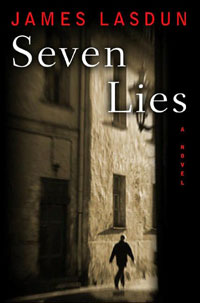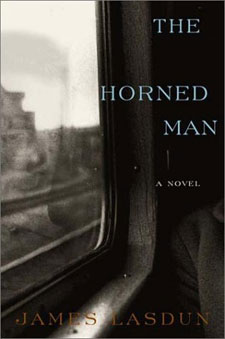
JAMES LASDUN
Writing Fellow at the Writers Institute
Poet and Fiction Writer
NYS Writers Institute, October 28, 2005
4:15 p.m. Reading/Signing | New Library, LE 320
PROFILE
James Lasdun is a poet, fiction writer and screenwriter. Born and raised in England, Lasdun has received awards and critical praise for his work on both sides of the Atlantic. Among his many honors, he is a recipient of a Guggenheim Fellowship in poetry, and the 1999 winner of the London Times Literary Supplement Poetry Competition.
 "[Lasdun is] certainly among the most gifted, vivid, and deft poets now writing in English. . ." - Anthony Hecht, Pulitzer prize-winning poet
"[Lasdun is] certainly among the most gifted, vivid, and deft poets now writing in English. . ." - Anthony Hecht, Pulitzer prize-winning poet
Lasdun's newest book, Seven Lies (2005), a political thriller about a former East German who, by a series of blackly comic and dangerous maneuvers, invents a perfect life for himself in the United States; inevitably, that life begins to unravel.
"A darkly brilliant tale by a writer whose last novel was "A Masterpiece" - Washington Post
"Poe for the 21st Century" - Salon
Lasdun's other books include the novel, The Horned Man (2002), which was a New York Times Notable Book and an Economist Best Book of the Year; The Siege and Other Stories (1999), of which the title story provided the basis of Bernardo Bertolucci's 1998 film, Besieged; and The Silver Age (1985), a story collection that earned the Dylan Thomas Award. The Washington Post Book World called Lasdun's stories of infidelity, insanity and manipulative relationships, "the most auspicious first collection of stories to come out of England" since the mid-1970s.
Lasdun's most recent collection of poetry, Landscape with Chainsaw (2001), was short-listed for the T. S. Eliot Prize of the Poetry Book Society, the United Kingdom's most coveted poetry award, and was a finalist for the Forward Prize and the Los Angeles Times Book Award. The book was also named one of the Times Literary Supplement's International Books of the Year. Landscape with Chainsaw explores the author's boyhood experiences in England, his adopted American homeland, and the landscape of the Catskill region of New York State where he now resides.
"an exciting mix of diction and contrapuntal surprises that mark this intimate and artful collection of poems." - Billy Collins, former U.S. Poet Laureate
"An extraordinary deconstruction and reconstruction of landscapes, both natural and interior." - The New Yorker
A Jump Start (1988), Lasdun's first poetry collection, received the Eric Gregory Award of the United Kingdom's Society of Authors. Writing in the Times Literary Supplement, Simon Rae praised the book for its "glittering brilliance" and "rich visual imagery." Other collections include The Revenant (1995) and Woman Police Officer in Elevator (1997). His poems have been published in the New Yorker, the Times Literary Supplement, the London Review of Books, and the New York Review of Books. With Michael Hofmann, Lasdun also edited the poetry anthology, After Ovid: New Metamorphoses (1994), which features reinterpretations of Roman myths by such poets as Amy Clampitt, Seamus Heaney and Robert Pinsky.
"a dazzling, intelligent new collection of poems." - Fiona MacCarthy, London Observer on The Revenant
"American readers who want to see rejuvenated form in untroubled action, giving brisk shape to contemporary and classical events, will find it in Lasdun." - Helen Vendler, eminent poetry critic, in New York Review of Books on Woman Police Officer
 Lasdun's first novel, The Horned Man (2002), which was named a New York Times Best Book of 2002, succeeds in being both comic and terrifying at once, is the story of a professor who is relentlessly persecuted by a secret enemy. . .Or is that simply a paranoid delusion? Lawrence Miller, a British expatriate living in New York City, is a professor of gender studies at a college that is a minefield of political correctness. He also serves on the college's sexual harassment committee. At the same time, his own relationships with women--his ex-wife, therapist, and a new dating prospect--are a source of ongoing confusion. His real troubles begin, however, when it appears that someone has been entering, perhaps even living in his office. Shortly thereafter, he finds himself framed for murder. . .
Lasdun's first novel, The Horned Man (2002), which was named a New York Times Best Book of 2002, succeeds in being both comic and terrifying at once, is the story of a professor who is relentlessly persecuted by a secret enemy. . .Or is that simply a paranoid delusion? Lawrence Miller, a British expatriate living in New York City, is a professor of gender studies at a college that is a minefield of political correctness. He also serves on the college's sexual harassment committee. At the same time, his own relationships with women--his ex-wife, therapist, and a new dating prospect--are a source of ongoing confusion. His real troubles begin, however, when it appears that someone has been entering, perhaps even living in his office. Shortly thereafter, he finds himself framed for murder. . .
"enormously inventive, superbly written novel [that] puts more seasoned authors in the shade." - The London Sunday Times on The Horned Man
"A tale of Borgesian complexity . . . reminiscent of a set of nested Russian dolls." - The Independent (UK)
"This psycho-thriller is clever, stunning and uncomfortable. Its twists had me thinking strange thoughts for days." - The London Daily Mail
With his wife, Pia Davis, Lasdun is also the author of a travel book, Walking and Eating in Tuscany and Umbria ( 1997). Lasdun's screenwriting credits also deserve mention. With director Jonathan Nossiter, Lasdun shared the Screenwriting Award for Sunday at the 1997 Sundance Film Festival. Sunday also received the Grand Jury Prize.
The film tells the story of a down-and-out Englishman living in a halfway house in Queens. While wandering the streets, he is mistaken by a B-movie actress--another transplanted Briton--for a famous director. As they talk and reminisce about England, a romance evolves.
Again with director Jonathan Nossiter, Lasdun cowrote the screenplay of Signs and Wonders (2002) an "emotional thriller" about an American living in Athens who falls in love again with his wife after having an affair with another woman. Lasdun's short story "Besieged" also served as the basis of Bernardo Bertolucci's 1998 film about an African domestic living in Italy who is besieged by the romantic advances of her English employer.
Lasdun has taught creative writing at a number of American colleges, including Columbia, Princeton, NYU and Bennington College. He was a guest at the Writers Institute on November 7, 2002, and during that semester he was a writer-in-residence.
Other Books by James Lasdun






Previous Articles:
Times Union Article
Writers Online Magazine Article
For additional information, contact the Writers Institute at 518-442-5620
or online at https://www.albany.edu/writers-inst.
